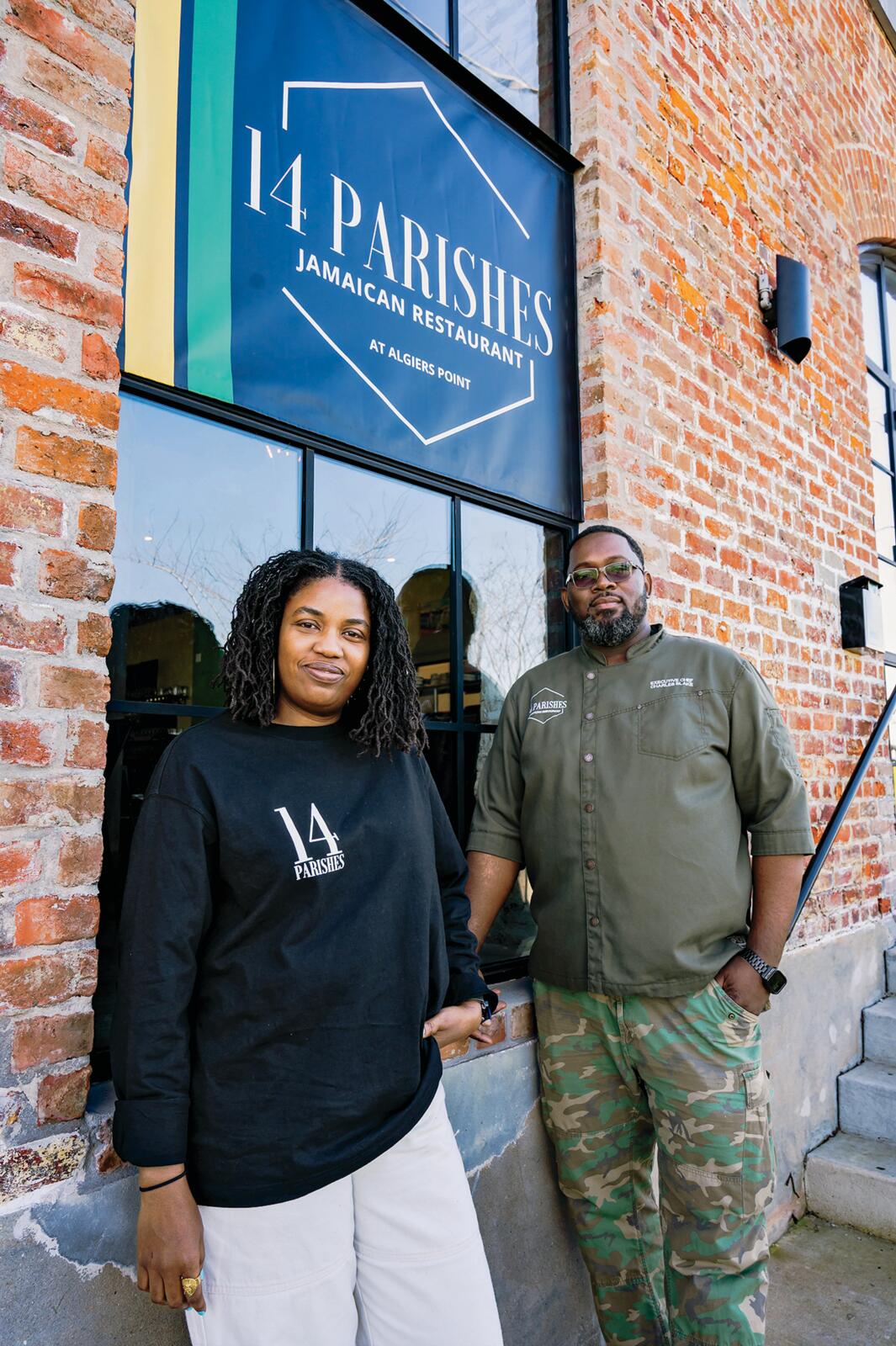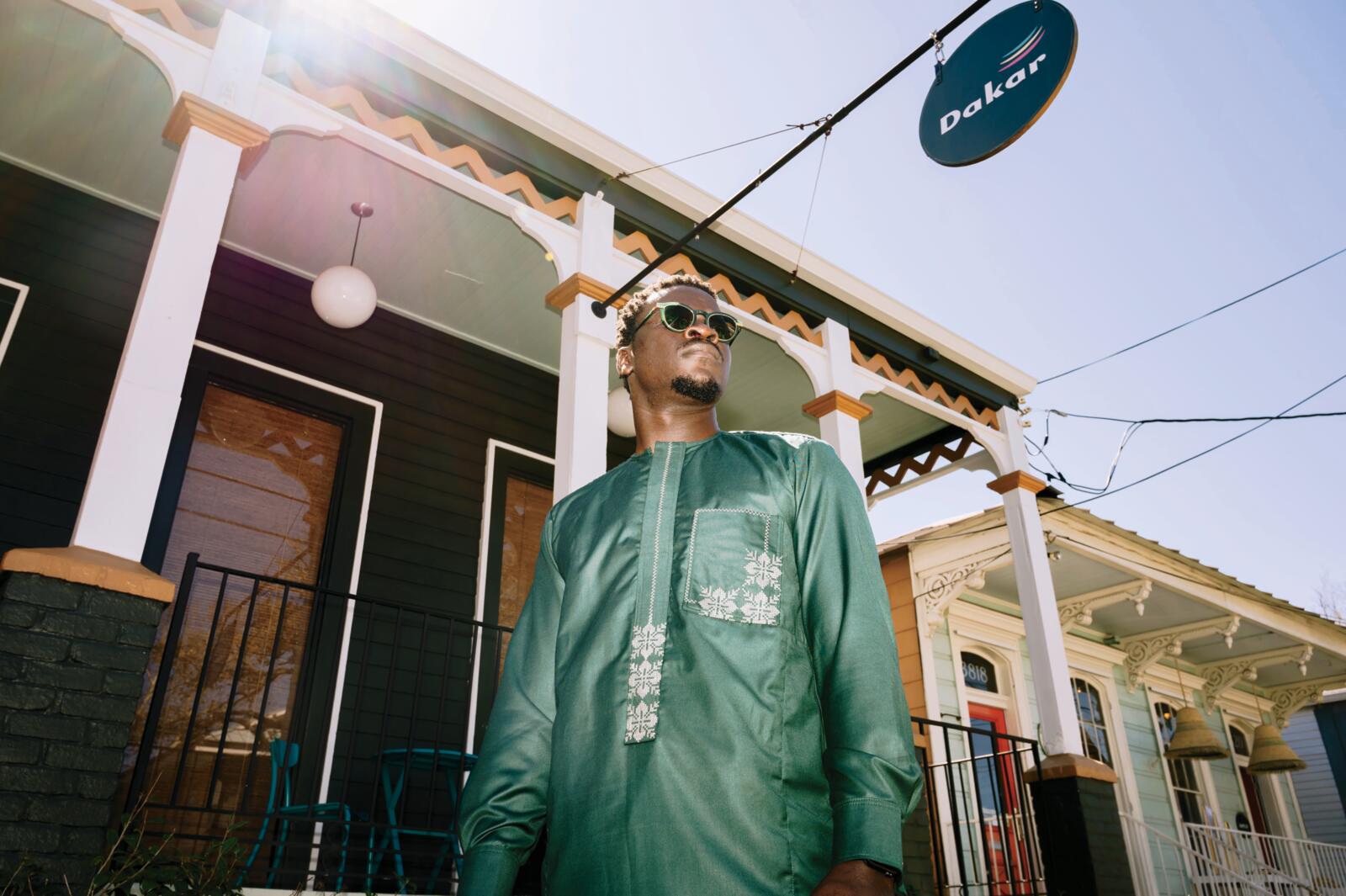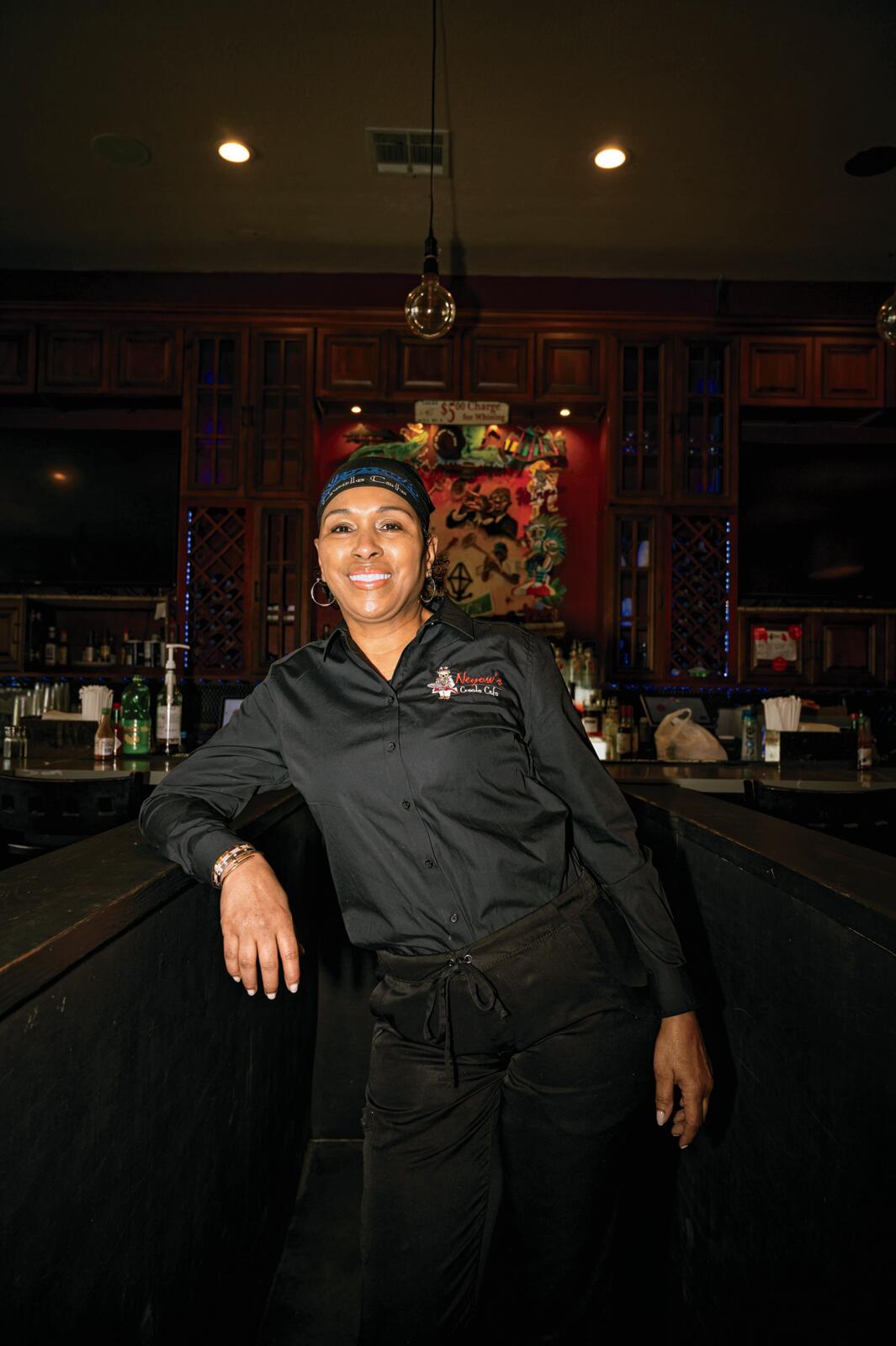This story appears in our May/June issue, officially on newsstands April 24.
African traditions have influenced the food dished out in New Orleans ever since the city was a major port in the domestic slave trade. Those enslaved Africans brought their cooking techniques, spices and herbs to the region, and you can almost taste it in every dish—the soul, the history, the resilience.
In this city, food is more than just sustenance: Culture and identity are served on a plate. Now, a new batch of Black chefs is reimagining the city’s culinary offerings—from Creole classics to bold new interpretations of West African and Caribbean flavors—while honoring its deep-rooted traditions.
Among the innovative establishments leading this movement is PRA_LEES, whose fusion of New Orleans flavors with global influences has captivated locals and visitors alike. There’s also Neyow’s, which continues to serve Creole soul food with a side of Southern hospitality; and Dakar Nola, whose chef and owner redefines fine dining through the lens of Senegalese cuisine. And at 14 Parishes, the essence of Jamaican cooking adds spice to the city’s vibrant food landscape. Together, these eateries and their chefs aren’t just feeding New Orleans— they’re shaping its future, one dish at a time.
Connecting Cultures
Chef Charles Blake and Lauren Johnson, the visionaries behind 14 Parishes

At any given moment you can hear Charles Blake’s friendly voice, tinged with the melodic lilt of his Jamaican heritage, around 14 Parishes, one of New Orleans’s most beloved Jamaican restaurants. The eatery is often filled to overflowing with locals and visitors who’ve come to enjoy the authentic island cuisine Blake grew up with. Hailing from the parish of St. Catherine, near the capital of Kingston, Blake found early joy in feeding people—namely his many siblings and his hardworking mother and father.
“My mom even allowed me to cook Sunday dinner and go to the church with the food,” Blake says. “If I don’t cook well and it doesn’t taste good, nobody eats. And this has been happening since I was 8, 9 years old.”
He continued cultivating those skills and eventually moved to the U.S., settling in Brooklyn, in 1996. In 2010, he went to Atlanta—where he opened his first restaurant, Island Breeze with a Touch of Soul, in 2011. In Atlanta he met his now-wife and business partner, Lauren Johnson; and in 2014, they moved to her native New Orleans. It was a fresh start for Blake, and one that reinvigorated his love of cooking. He began by selling plates of dinner from the trunk of their car. He prepared all the Jamaican classics, including jerk chicken, rice and peas, and oxtail. The food quickly became a hit around town, and before long, the couple realized they needed a home for Blake’s sought-after cuisine.
In 2016 they opened 14 Parishes—a nod to the different municipal divisions in Jamaica, much like those in Louisiana. The establishment stood out as one of the few authentically Jamaican restaurants in the city, focused entirely on dishes from that culture. This was deliberate. “Everywhere you turn in New Orleans, you’ll find a New Orleans–themed restaurant, but this is something different,” Blake explains.
By 2018, patronage was steady and they needed a bigger kitchen. They closed up shop and reopened at Pythian Market food hall. It was a considerable feat and looked promising—until the owners of the Pythian Market were evicted. “We had to close down,” Johnson says. “That hurt.” But the couple opened another location, in the Algiers Point neighborhood, that same year. Their newest venture: Likkle 14 food truck, which opened in March of this year.
Diasporic Delicacies
Serigne Mbaye, co-owner and head chef of Dakar Nola

Upon stepping through the doors of Dakar Nola, you might feel as if you’re no longer in New Orleans.
Intricately carved African artifacts adorn the richly colored walls. Instead of the customary Cajun aromas the city is known for, spices like tamarind, cinnamon and cumin beckon guests. The dining experience is a diasporic journey—thoughtfully curated by Chef Serigne Mbaye and his business partner, Afua “Effie” Richardson. Together they have blended Mbaye’s rich Senegalese heritage with the vibrant culinary traditions of New Orleans, creating an establishment that has garnered national acclaim.
Born in Harlem to Senegalese parents, Mbaye was immersed in that West African culture at a young age. His parents sent him to a school in Senegal, where he lived until he was 15. During this formative period, he began learning to cook traditional Senegalese dishes, laying the foundation for his future endeavors.
Through Dakar Nola, Mbaye continues to bridge continents and cultures; he offers diners a unique and enriching feast that celebrates the shared histories and flavors of Senegal and New Orleans. The widely lauded chef, whose industry awards include the 2024 Best New Restaurant James Beard honor, garnered success at the age of 30—even though he hadn’t initially planned on forging a career in the culinary arts.
“I didn’t know I wanted to be a chef early on,” Mbaye says. He didn’t consider that path until he was in his late teens and returned to the U.S. from Senegal.
“I quickly realized that food was what I was meant to be making—it was my passion, my destination,” he says. “I didn’t speak English, and I couldn’t get a job anywhere except in a restaurant, as a dishwasher. But that passion led to many other things. Today, look, here we are.”
Indeed, only a decade and a half after Mbaye realized his passion, Dakar Nola is one of the most buzzed-about restaurants in the city—because of its delicious fare and its commitment to bridging diasporas.
“Dakar and New Orleans are very similar in their artistic natures, kindness and hospitality,” Mbaye says. He explains that the two cultures share teranga, a Wolof word that means “hospitality” and is a core value in Senegalese culture. He has felt this commonality since he moved to New Orleans for his first-ever culinary job—at Commander’s Palace, a notable Creole eatery.
“As I learned about New Orleans,” he says, “I began to understand its history and how much it has influenced West Africa.” Senegal and New Orleans, particularly the Senegambia region, were both colonized by the French. Mbaye believes this helps to explain why the core values in both places are the same and to illuminate their deep historical connection.
“People here in New Orleans will treat you like they love you the moment they meet you,” he points out. “You could be a stranger. It doesn’t matter. They look at you as a human.”
Ancestral Cuisine
Tanya Dubuclet, owner and head chef of Neyow’s

Like many little girls, Tanya Dubuclet was close to her grandmother-, the family matriarch, who often gathered her loved ones around through her cooking. Granddaughter and grandmother were pretty much joined at the hip; Dubuclet learned all the secret recipes and could replicate them as she grew older. After her grandmother passed, an 18-year-old Dubuclet was inspired to keep her memory alive through the dishes she had so lovingly prepared.
“She never gave me measurements,” says Dubuclet. “That’s why everything I cook I have to taste, to make sure it’s right. It wasn’t until I got into the restaurant that measurements were factored in.”
She’s referring to Neyow’s, one of the top Cajun restaurants in New Orleans. It’s easy to assume that the path to opening the eatery was linear, but there’s more to the story. After successfully owning and then closing her own restaurant, Dubuclet chose to focus on family, which included her three children and her husband. An admitted busybody, she leaned into her entrepreneurial nature in the early aughts because of her children. As she explains, “I just wanted to take my kids to Houston, to AstroWorld,” the popular amusement park that closed in 2005. But to do that, she needed to generate some extra cash.
A family friend suggested that Dubuclet sell dinner plates from her home. The orders poured in, and in just a few days, she earned the money. That sparked the idea for a new restaurant.
In 2010, Dubuclet and her husband opened Neyow’s; the name is a derivation of a nickname for their beloved dog’s breed, the Neapolitan Mastiff. Having established a stellar reputation for her homemade dinner plates, Dubuclet attracted a steadily growing clientele, primarily through word-of-mouth.
“Now, guess what?” she asks in her warm Southern drawl. “We opened after Hurricane Katrina, and I’m always impatient.” She initially wanted the restaurant to pick up a bit more, but she quickly learned to count her blessings. “We were never in the red—and the bills were paid, rent was made, and we were happy,”
she says. Even better, the “slow period” didn’t last long. Just three years later, the restaurant was forced to expand due to the high demand.
The Dubuclets opened an even larger location right next door, to accommodate the often long lines of excited customers. Everything on the menu is inspired by Dubuclet’s grandmother’s recipes, which are mostly a secret to outsiders. Each dish, like the matriarch’s, is cooked with love—but Dubuclet’s favorite is her grandmother’s gumbo. “I can eat her gumbo every single day,” she says, “and then you know what’s so crazy? I don’t even like any of the ingredients in it. I like the juice. I like the juice and the rice, and that’s it.” It’s clear she knows how to mix up magic, as with this dish, yet keep life simple and delicious.
Food and Family
Bryant Lee, owner of PRA_LEES

Bryant Lee and his mom started baking and selling desserts to local stores in 2012. His mom was known for her praline cupcakes, while Bryant focused on rich, praline brownies. Watching his mom put smiles on people’s faces because of something she made in their kitchen stuck with him for two reasons: She was able to create joy for others, and she was her own boss.
That’s why, years later, Lee is a serial food entrepreneur. He first launched PRA_LEES, a portmanteau for pralines and his family name, in 2013. The family-run restaurant sells his mom’s cupcakes among other sweet treats. He later expanded the menu to include savory items like fried seafood and assorted Cajun side dishes. “Food is a universal love language,” says Lee. “Starting a restaurant also allows me to be with my loved ones.”
According to Lee, it took about five years for the brand to take off—and over time, locals became familiar with the name and began flooding to the cozy location on Frenchman Street in the Seventh Ward.
Always bustling, the restaurant sees a few hundred customers per day. Even more impressive is that Lee seldom has to allocate any of the operating budget to advertising. “I don’t speak for it,” he confirms. “The food speaks for itself.”
Alongside his mother and brother, Lee has created a delicious menu anchored by fan favorites: fried salmon, fried teriyaki brussels sprouts, crawfish mac and cheese, jambalaya, and red beans and rice. While heading up operations, Blake is also the head chef. “From the time our doors open at 11 A.M., the customers don’t stop rolling in until 9 P.M.,” he says. During that time, he’s in the kitchen preparing dishes.
To accommodate the overflow, Lee opened a food truck not far from the eatery. Next door, is another hot spot—Jr’s. Snowballs (named for his 14-year-old son), selling refreshing shaved ice with fresh fruit puree. This summer there will be an outdoor dining and entertainment space for PRA_LEES too. Lee attributes the restaurant’s success to his and his family’s deep passion for the restoring power of food.







